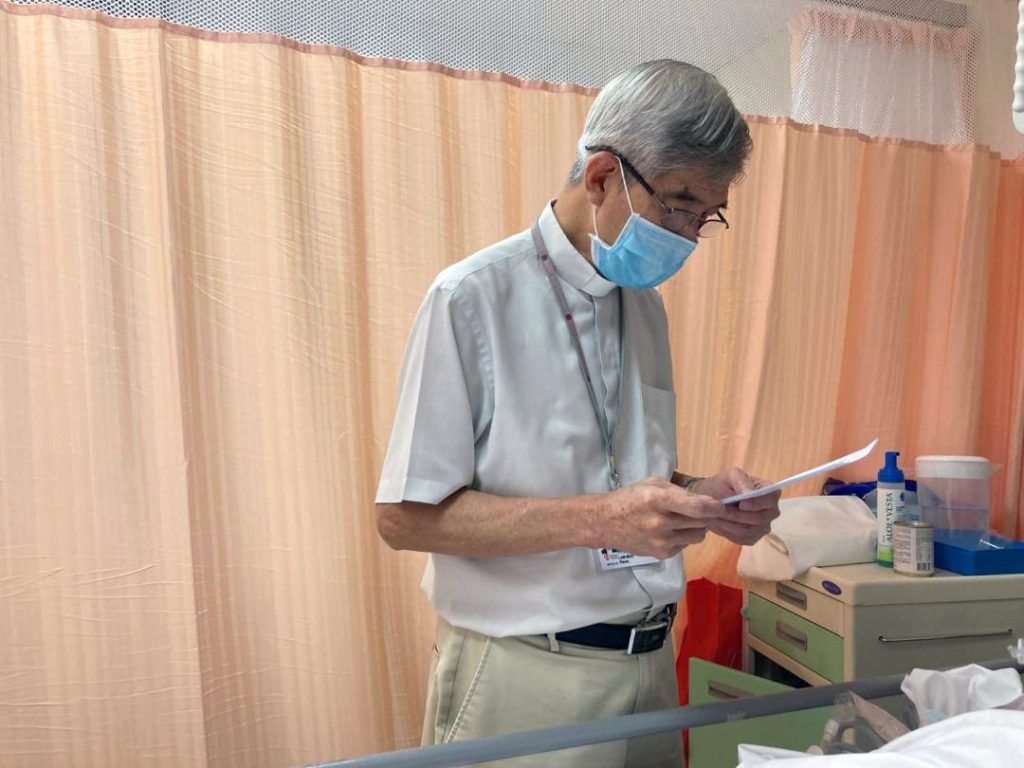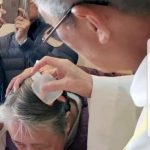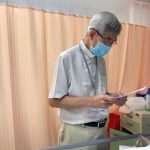
Le père Pierre Lam Minh à l’hôpital durant la pandémie.
From the time that the Covid-19 pandemic began, more than a year ago, weren’t you afraid, Father, of going into hospitals because of the virulence of the disease. Did the risk of being infected there worry you?
At the beginning of last year, when I had to go to a hospital, I did feel some fear or apprehension because this epidemic was new, nobody knew about this disease or how to treat it. So the thought came that Jesus had healed many sick people, that he had touched lepers, that he drew near to those who were in need and that he saved them. Since then, I have found in the Lord Jesus the courage and the strength not only to pay attention to the virulence of the epidemic but, even more, to be aware of the needs of the sick. I am a humble instrument of God and I hope to be able to bring, on his behalf, blessing and comfort, healing and peace to the sick.
What did the epidemic change as regards your visits to people in hospital?
In these times, just being able to get to the bedside of a sick person is a gift, both for the person who is ill and for their visitors as, during an epidemic, visits are strictly regulated to protect both the patients and the persons who come to see them. First of all you have to submit a visitor request to the hospital management and then, if this is approved, you have to observe a variety of measures to prevent infection, which is not at all easy. Sick people really want to have someone visit them, and we too are very keen to go to them to pray for them, to bless them and, in particular, to administer the sacrament of the Anointing of the Sick.
Which events particularly affected you?
There are so many of them. A few examples come to mind. There are mothers who gave birth prematurely or had a miscarriage, the child died, this is very painful and sad for young parents, especially for the mothers. We can only pray for the foetus and the parents, we can only accompany them and pray with them, asking God to strengthen their faith and comfort them, to give them the grace and strength to face this ordeal.
In this kind of situation, the presence of nuns from the chaplaincy is a great help. We often see these parents finding some peace and comfort in their pain.
In certain circumstances, the hospital allows us to visit a patient, but, because of the risk of infection or because only family members are permitted to enter their room, the doctor only allows us to pray for them together with their loved ones and to bless them remotely by means of an audiovisual link. Although it is not possible to be physically near the person to celebrate the sacraments and to pray together, we believe that the blessing, grace and peace of God will become a reality for the sick person even by this means.
Recently, there was a particularly moving case: a woman with a serious illness who, although not baptised, had asked us to pray for her. The first time we prayed with her, she shared the journey of her life with us. As a child, she had studied in a Catholic school, discovered the Bible and the faith, but had not chosen to be baptised. When remembering the past and confiding in Sister Cheung and myself, she was very moved and deeply grateful for all the grace God had given her. She also deeply regretted her past faults and not having seized the opportunities that God gave her. After that she gradually regained her confidence, listened to the word of God and to hymns, and she prayed with us. After some time she received the divine grace of faith and was baptised. From then on, every week we prayed with her and for her, and we gave her Holy Communion. Once or twice, when her condition became critical, we gave her the sacrament of the Anointing of the Sick. Each prayer and each blessing brought her confidence and the strength to bravely face the sufferings of her illness and, each time, brought hope, joy and peace. This situation continued for three months until she left this world peacefully in mid-July to go to rest in the Lord. All this was, for her, a great grace and a great blessing from God, but also a blessing for us who were going to visit her, because God gave us the grace to accompany, comfort and bless this sister in Christ, praised be the Lord!
We know, Father, that initially you were a bit hesitant about getting vaccinated but, as you have to make visits to nursing homes as part of your pastoral work, you eventually decided to have the injections. Could you tell us what was the basis for your decision and how, as a pastor, you came to take it?
I delayed getting vaccinated because I was worried that the injections might cause reactions or side effects that would affect my health. Since August, hospitals have required all visitors to be vaccinated. Motivated on the one hand by this requirement from hospitals and, on the other, by the requirements of my pastoral work, I eventually decided to be vaccinated in order to be able to make myself available to visit the sick, to serve people in need, to confer the sacraments, and to carry out my pastoral mission. In fact, it is the love of Christ that impels me, and faith gives me hope and strength, to become more and more like Christ, a good Shepherd giving his life for his sheep.
From the beginning of the epidemic until now, during its different phases, various administrative regulations concerning pastoral care for the sick have been introduced. What is your view of these regulations?
Over the course of this pandemic, various administrative regulations have been introduced successively concerning pastoral care in hospitals. At first, I found them very upsetting, very restrictive, and I felt a sense of helplessness. Why so many restrictions, aren’t healing of the heart and salvation of the soul even more important? Later, I understood that the purpose of the hospital restrictions and regulations were all for the good of the patients and sought to prevent visitors and patients from infecting each other. As a result, I ended up accepting the hospital regulations and viewed them positively. I would like here to pay tribute to the members of the Catholic pastoral units working in hospitals. I greatly appreciate their spirit of service. Whenever a Catholic is admitted to hospital, they do their best to ask permission and make the necessary arrangements for a priest to visit, pray, bless and administer the sacraments. I sincerely thank them and pray to the Lord to bless them and their ministry.
Fr Pierre Lam Minh, MEP
Article published in Chinese in the magazine Hospital pastoral care in December 2021 and translated into French by Fr Xavier Demolliens, MEP.
1. Catholic pastoral units, which are present in most Hong Kong hospitals, are the chaplaincies in charge of pastoral care for the sick. They are recognized by the hospital administration and cooperate with nearby parishes. The managers and the permanent staff of these chaplaincies are lay people and nuns employed by the diocese.
- Le père Pierre Lam Minh à l’hôpital durant la pandémie.
- La baie de Hong-Kong.
- Le père Pierre Lam Minh à l’hôpital durant la pandémie.


